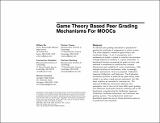Game Theory based Peer Grading Mechanisms for MOOCs
Author(s)
Wu, William; Kaashoek, Nicolaas; Tzamos, Christos; Weinberg, Matthew; Daskalakis, Konstantinos
DownloadDaskalakis_Game theory.pdf (736.4Kb)
OPEN_ACCESS_POLICY
Open Access Policy
Creative Commons Attribution-Noncommercial-Share Alike
Terms of use
Metadata
Show full item recordAbstract
An efficient peer grading mechanism is proposed for grading the multitude of assignments in online courses. This novel approach is based on game theory and mechanism design. A set of assumptions and a mathematical model is ratified to simulate the dominant strategy behavior of students in a given mechanism. A benchmark function accounting for grade accuracy and workload is established to quantitatively compare effectiveness and scalability of various mechanisms. After multiple iterations of mechanisms under increasingly realistic assumptions, three are proposed: Calibration, Improved Calibration, and Deduction. The Calibration mechanism performs as predicted by game theory when tested in an online crowd-sourced experiment, but fails when students are assumed to communicate. The Improved Calibration mechanism addresses this assumption, but at the cost of more effort spent grading. The Deduction mechanism performs relatively well in the benchmark, outperforming the Calibration, Improved Calibration, traditional automated, and traditional peer grading systems. The mathematical model and benchmark opens the way for future derivative works to be performed and compared.
Date issued
2015-03Department
Massachusetts Institute of Technology. Department of Electrical Engineering and Computer ScienceJournal
Proceedings of the Second (2015) ACM Conference on Learning @ Scale (L@S '15)
Publisher
Association for Computing Machinery (ACM)
Citation
William Wu, Constantinos Daskalakis, Nicolaas Kaashoek, Christos Tzamos, and Matthew Weinberg. 2015. Game Theory based Peer Grading Mechanisms for MOOCs. In Proceedings of the Second (2015) ACM Conference on Learning @ Scale (L@S '15). ACM, New York, NY, USA, 281-286.
Version: Author's final manuscript
ISBN
9781450334112